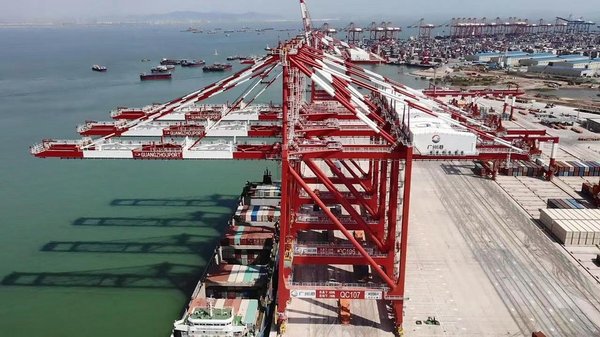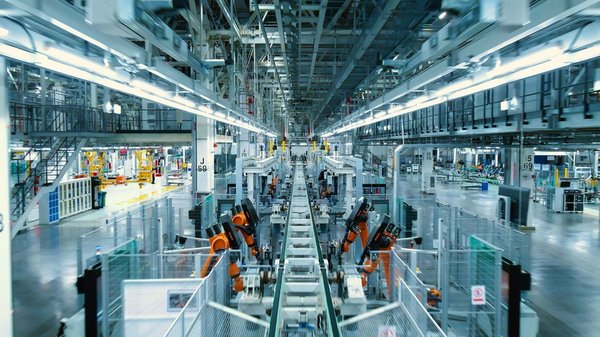Xiconomics: China Strives to Push for Peace and Development in Stormy Times
 |
| File photo shows the construction site of the fourth-phase project of Nansha Port in Guangzhou, south China's Guangdong Province. [Xinhua] |
BEIJING, April 27 (Xinhua) — The Russia-Ukraine conflict is one shock too many for the world economy struggling to get back on its feet from the COVID-19 pandemic.
Rising energy prices have pushed inflation in many countries to the highest levels in decades. Food insecurity is deepening across the Middle East and Africa that heavily rely on imports from Russia and Ukraine. Nations that should have stood together in such trying times are drifting apart, impacted by power politics, unilateralism and protectionism.
Given the risks and challenges, the International Monetary Fund (IMF) and the World Bank slashed their global growth forecast for 2022 earlier this month. "To put it simply: we are facing a crisis on top of a crisis," said IMF Managing Director Kristalina Georgieva.
Sustainable growth requires a peaceful economic and political environment. Therefore, in light of the widening development gap and peace deficit, Chinese President Xi Jinping has proposed a series of initiatives to address global challenges while rejuvenating global development.
 |
| People select products at a supermarket in Lianyungang City, east China's Jiangsu Province, March 10, 2021. [Photo by Wang Chun/Xinhua] |
Balancing Act
Over the past two years, China's economy has delivered an impressive performance despite the pandemic, and is now growing steadily.
Adapting to challenges at home and abroad better than expected, China notched a GDP growth rate of 4.8 percent in the first quarter year on year, beating estimates of 4.4 percent and outperforming the 4-percent rate registered in the previous quarter.
The rate is hard-won, with the country grappling with an upsurge in COVID-19 cases and the impact of the Russia-Ukraine conflict.
China has adhered to a dynamic zero-COVID policy tailored to its national realities, clearing infections promptly and tweaking it in line with an evolving situation on the ground.
Human beings are one of the most decisive factors in guaranteeing robust productivity. Behind China's arduous efforts to strike a balance between epidemic control and socio-economic development is the value of putting human lives first and focusing on the greater common good, as illustrated by "Xiconomics," the Chinese president's economic philosophy.
Whether in the financial hub of Shanghai or elsewhere in the country, an effective epidemic control remains a precondition for economic growth in the long run and an optimal choice at present.
The dynamic zero-COVID approach yields better results "on every measure, from death rates to economic growth," said New Scientist, a London-based magazine covering science and technology.
"If the target of zero COVID is now being ditched, does that mean it was a failure? A crude answer would be: only if you think saving lives and preserving economic growth constitutes a misstep," it said.
Moreover, to retain sound fundamentals over the long haul, China is rolling out policies to support enterprises, stabilize employment and maintain a prudent monetary policy, practicing its "dual circulation" model that emphasizes both growing exports and expanded domestic demand.
"The fundamentals of the Chinese economy — its strong resilience, enormous potential, vast room for maneuver and long-term sustainability — remain unchanged," Xi said last week in his keynote speech via video at the opening ceremony of the Boao Forum for Asia Annual Conference 2022.
"They will provide great dynamism for the stability and recovery of the world economy and broader market opportunities for all countries," Xi said.
 |
| Photo taken on Dec. 21, 2021 shows a view of the new Tiexi Plant of BMW Brilliance Automotive (BBA) in Shenyang, northeast China's Liaoning Province. [Xinhua] |
Continued Confidence
Although it marked down China's growth forecast for this year in its latest report, the IMF expressed confidence in its outlook of the world's second-largest economy.
"We see China capable of boosting the economy, because it has ample policy space," the agency's chief said last week.
"We have seen in the last days, the People's Bank of China taking action to ease conditions for access to credit," Georgieva said. "And it also has space in terms of fiscal policy."
It takes good iron to make good products, a Chinese saying goes. China has been leading by example on how a science-based economic philosophy unleashes growth momentum at home and drives regional and global development with positive spillovers.
According to Bloomberg, Chinese policy over the past two years "has prevented a huge number of deaths at home and ensured that everything from iPhones and Teslas to fertilizer and car parts continues to flow to the rest of the world."
The alternative "could bring global supply chains to a halt, sending inflation higher," Bloomberg said.
In the first quarter of this year, China's total imports and exports expanded 10.7 percent year on year to 9.42 trillion yuan (about 1.47 trillion U.S. dollars), the seventh consecutive quarter of growth.
The country retains its appeal to regional and global investors with a fully-established industrial chain, industrial clusters and a massive consumer market.
Foreign direct investment into the Chinese mainland, in actual use, went up 31.7 percent year on year to 59.09 billion dollars in the first quarter of the year. Inflows into the country's high-tech industries logged a sharp yearly increase of 52.9 percent, according to official data.
According to a survey last year by the American Chamber of Commerce in Shanghai, 60 percent of more than 300 U.S. companies operating in China reported increased investment compared with 2020.
Continued confidence in China can also be found in the annual Business Confidence Survey 2021 published by the European Union Chamber of Commerce in China. Only 9 percent of nearly 600 European companies operating in China planned to shift any current or planned investment out of the country, the lowest share on record.
"China's economy continues to have massive growth potential," said Khairy Tourk, a professor of economics with the Stuart School of Business at the Illinois Institute of Technology in Chicago. "I feel quite optimistic about the country realizing its potential."
On the supply side, China has a blueprint for changing its economy from a low-end manufacturer to a high-end producer, said Tourk. "This has advantages in raising people's living standards and acting as a hedge against external shocks."
 |
| A freight train heading for the Laotian capital Vientiane departs from the Xi'an international port in Xi'an, northwest China's Shaanxi Province, April 22, 2022. [Photo by Liu Xiang/Xinhua] |
Initiatives for Common Good
While managing steady and high-quality growth within its border, China has always been ready to join others in promoting common prosperity for the whole world.
At the General Debate of the 76th Session of the UN General Assembly in 2021, Xi put forward a Global Development Initiative (GDI), which emphasizes openness, coordination and sharing.
Together with the Belt and Road Initiative, the GDI comes as another endeavor by Beijing to boost inclusive and common development around the world.
Over the past few years, the China-Laos Railway unlocked the landlocked country and connected it to markets as far away as in Europe. China-Europe Freight Trains travel across the Eurasian continent, transporting goods and sustaining global supply chains despite disruptions from the pandemic and the Russia-Ukraine conflict.
At the Boao Forum last week, the Chinese president further elaborated on his vision for building peace and sustainable development, quoting an ancient Chinese philosopher: "Stability brings a country prosperity while instability leads a country to poverty."
Security is the precondition for development, both for a country and the world, especially in an era of globalization.
To improve global governance in this regard, Xi proposed a Global Security Initiative, calling for joint efforts to maintain peace and stability worldwide. "We humanity are living in an indivisible security community," Xi said.
"China will unswervingly follow the path of peaceful development and always be a builder of world peace, a contributor to global development, and a defender of the international order," Xi noted.
His appeals have been warmly embraced.
Surakiart Sathirathai, former deputy prime minister of Thailand, said that the Global Security Initiative reflects Xi's global view and governance philosophy.
By shaping a fair and rational global security governance system, the world will be more stable, which is conducive to greater development and cooperation, Sathirathai said.
"Looking into history, it is safe to say that China will successfully navigate the current challenges to register sustained growth," said Cavince Adhere, a Kenya-based international relations scholar.
Through China-proposed initiatives, "China is galvanizing like-minded countries to promote alternative and liberalized economic and political systems that serve the collective interest of all countries," he said.
(Source: Xinhua)
Please understand that womenofchina.cn,a non-profit, information-communication website, cannot reach every writer before using articles and images. For copyright issues, please contact us by emailing: website@womenofchina.cn. The articles published and opinions expressed on this website represent the opinions of writers and are not necessarily shared by womenofchina.cn.








 WeChat
WeChat Weibo
Weibo 京公网安备 11010102004314号
京公网安备 11010102004314号